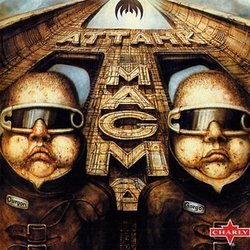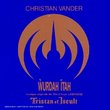| All Artists: Magma Title: Attahk Members Wishing: 2 Total Copies: 0 Label: 101 DISTRIBUTION Release Date: 1/6/2009 Album Type: Import Genres: Jazz, Rock Styles: Jazz Fusion, Progressive, Progressive Rock Number of Discs: 1 SwapaCD Credits: 1 UPC: 803415120024 |
Search - Magma :: Attahk
CD DetailsSimilar CDs |
CD ReviewsImpossible To Categorize L. M. Gulick | Warrensburg, MO USA | 01/06/2009 (4 out of 5 stars) "I had already heard several of the songs on "Attahk," so I really thought I was prepared for this album. Wrong. This album not only doesn't sound like any other Magma disc up to that time (1977), it also doesn't sound like anything else ever recorded. It turns out that the three tracks I had heard--"The Last Seven Minutes," "Rind^e," and "Dondai"--are the tamest ones on "Attahk." All of these are excellent. "...Seven Minutes" is a great rock/funk jam, while "Rind^e" is a showcase of Magma's collective vocal chops. "Dondai" is a hypnotic, gentle, swing-type piece, and very soothing after the turbulent and warlike "Maahnt," in which Christian Vander appears to be playing all the roles (and for sheer creepiness, it beats out "Troller Tanz" and "Zombies" hands down)! "Spiritual" is exactly what it intends to be--a good old-fashioned, hand-clapping Black Gospel number, but sung in Kobaian. "Lirik Necronomicus Kant" is probably the funkiest track; I'm not sure who "Ourgon" is, but "Gorgo" is the Kobaian name of guitarist Jean Luc Chevalier, who also plays on the "Retrospektiw" sets. (There was no personnel roster listed on the disc cover, so this is just an educated guess.) The final track, "Nono," has a funk feel as well. My only real fuss with this disc is its sound quality; in places the music almost drowns out the words. I don't know if that's how the album sounded originally, or if it's a result of the digital remastering that was done by the studio. That's another thing--this is the only one of my Magma discs that didn't come from 7th Records; it's on the British Charly label, and it was they who did the remastering, and not Christian Vander himself. But outside of this, "Attahk" is a very enjoyable listen...even if it is impossible to categorize!" A Sonic "Attahk" On Aficionados Of Classic Magma Carnamagos | Northeastern U.S.A. | 06/23/2010 (1 out of 5 stars) "As others have noted, Magma's 1978 album *Attahk* marked a controversial departure from the group's previous work. Many applaud the band's alleged exploration of "new" avenues. I, however, am not one of them: First, because novelty in itself is not a virtue, and second, because although a given style may be new to a group, that fact does not make it new to the listener. Jazz fusion and disco/funk were well established in 1978, and the last word that comes to mind when hearing Magma try its incompetent hand at these genres is "progress".
Despite its falling officially under the rubric of "Magma", *Attahk* is essentially a Christian Vander solo album (which is perhaps why the back cover credits the record to "Christian Vander's Magma"). Here, Vander strays far from his European Classical music roots (Stravinsky, Bartok, Orff) to explore funky, quasi-disco themes that could not be farther removed from the legendary Magma style. 1975's uneven *Live* album signaled an interest in jazz fusion, and this type of music appears on *Attahk*, as well ("The Last Seven Minutes"). Other tracks feature an embarrassing and repetitive, hiccuping hybrid of these two styles ("Nono"). Indeed, it is the repetition that largely makes this album so singularly unlistenable. Many who defend this waste of plastic do so by saying, "well, not every piece has to be twenty minutes long". True enough, but, to me, even though these pieces are relatively brief, they seem to continue forever, and feel much longer than Magma's past "epics". ("Nono", in particular, is a real nails-across-the-blackboard endurance test). Even the initially dulcet and lovely "Dondai" rapidly outstays its welcome, through inept and failed attempts at thematic variation. At the risk of inspiring ignorant and superficial misunderstandings, I will state that I am firmly in the camp that feels Vander to be at his best when he allows his European musical influences free reign, and at his worst when he tries to be John Coltrane, Ray Charles, or Otis Redding. In any case, the nadir of Vander's output was yet to come, but *Attahk* shows that the disease was well advanced. The decline from *Wurdah Itah* and *Kohntarkosz* to "Otis" and "Call from the Dark (Ooh, Ooh, Baby)" is monumental, and *Attahk* is best viewed as a snapshot of a creative free-fall in progress, the "cry" of a formerly lofty composer who is about to make messy contact with the concrete, below." |



